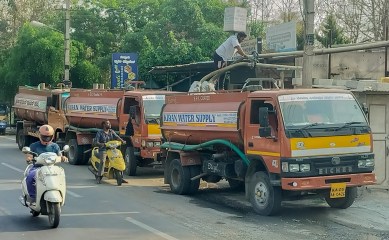Stay updated with the latest - Click here to follow us on Instagram
From curbs on usage to shutting down swimming pools, how Bengaluru is tackling the water crisis
While summer days are ahead, there are concerns over Cauvery water supply, depleting groundwater level.

At a time when Bengaluru has been grappling with water woes, the Karnataka government and other civic bodies and authorities have brought in curbs to manage the usage to avert a crisis.
With concerns over Cauvery water supply, depleting groundwater level, the city has been trying hard to prevent misuse and save water.
monthly limit of free stories.
with an Express account.
What has BWSSB done to tackle the water crisis ?
Amid the lack of water availablity, the Bangalore Water Supply and Sewerage Board banned the use of potable water for cleaning vehicles, gardening, building construction, fountains, swimming pools, entertainment purposes other than as drinking water in cinema halls and malls. The authority also imposed a fine of Rs 5,000 in case of violation.
Amid depletion of groundwater, the BWSSB has made it mandatory to take prior approval ahead of drilling borewells in its limits. Karnataka Deputy Chief Minister D K Shivakumar last week said that over 3,000 borewells in the city have dried up.
After facing a shortage of vehicles to supply water, the BWSSB wrote a letter to transport department seeking to impound private water tankers. As a measure to curb soaring water tanker prices and address the issue, each of the 17 Road Transport Officers in the department implemented the same.
Bengaluru Urban district administration
After private water tankers were accused of fleecing the public amid the crisis, the Bengaluru district administration capped the prices charged by water tankers from the residents. The civic body Bruhat Bengaluru Mahanagara Palike fixed the rates for 200 private tankers deployed on a contract basis for a period of four months in the drought-hit district. While 315 water tankers have registered with the government, the civic body has decided to seize tankers which fail to do so.
Schools look for alternate option
The water crisis hit schools in Bengaluru adversely with Abheek Academy, a private home school off Bannerghatta Road temporarily shutting its door. Government Primary School in Hosakerehalli is relying on tanker services to meet its non-drinking water purposes after running out of borwell water.
Apartments hit massively
Apartments, which mostly rely on their borewells, are also facing the grim crisis. Several apartments banned washing of vehicles and temporarily shut down their swimming pools.
Fire department
The fire department, which runs for rescue operation, is also not getting sufficient water. The city reports an average of 50 incidents everyday and fire officials told The Indian Express that they face such a crisis usually during April or May.
Hotels and restaurants
Meanwhile, some of the hotels and restaurants took preemptive decision of installing adequate water management systems such as rainwater harvesting and STPs and are able to meet their needs. However, some hotels in East Bengaluru like Sarjapur and Marathahalli seem to be struggling.
Farmers sell their cattle
Farmers who struggle with crop failure, are finding it hard to sustain their cattle amid severe drought conditions. In a recently held fair in Asundi village in Gadag city, several farmers sold their cattle.